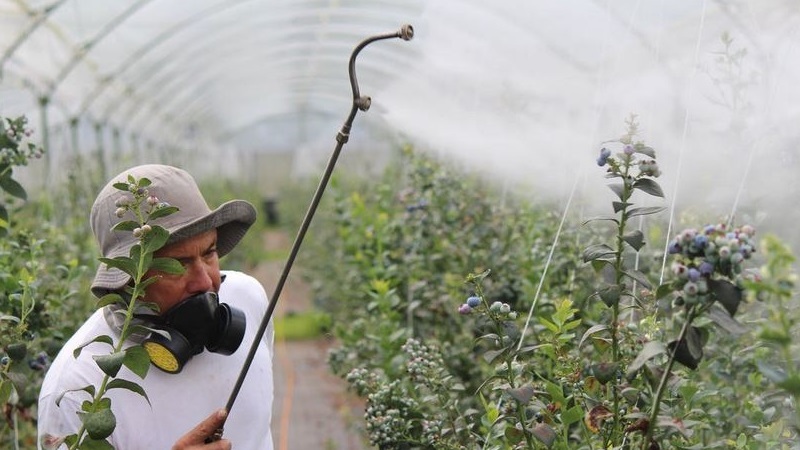Trial opened Aug. 3 in St. Louis with three plaintiffs accusing Monsanto and its weed control pesticide Roundup for causing their lymphoma-type cancers, a claim that defense attorneys for the company will say is more likely caused by abnormal human cell division.
The latest trial against the agrochemical biotechnology giant Monsanto Co. in the 21st Judicial Circuit of Missouri is being streamed live courtesy of Courtroom View Network.
The suit filed by the plaintiffs Marty Cox, Cheryl Davis and Gary Gentile asks for punitive damages for medical bills, treatments, physical pain and mental anguish. Cox was diagnosed with B-cell lymphoma, Gentile with high-grade-B-cell lymphoma and Davis with follicular lymphoma.
During opening remarks on Wednesday the attorney for the plaintiffs Gibbs Henderson of the Dallas law firm of Fear Nachawati told the court the pesticide Roundup is able to penetrate a leaf from a plant as well as human skin.
“There are holes in your skin hole ducts,” he said. “It (Roundup) gets into your bloodstream. It gets into the lymphatic vessels; it travels into the lymph nodes, that’s where the lymphoma starts. Non-Hodgkin’s Lymphoma is a cancer of the white blood cells.”
Henderson said since the Roundup product was put on the market in 1974, sales of the product has gone steadily upward.
“It (Roundup) dwarfs any other pesticide,” Henderson said. “This was a blockbuster (profit) for Monsanto. Monsanto chose not to do an epidemiology study on Roundup.
Henderson noted that the occurrence of the cancer has a “latency period,” sometimes taking years to show up.
“It doesn’t happen immediately after exposure,” he said.
Henderson said people who used the product were up to three times more at risk than non-users.
The herbicide ingredient in Roundup is glyphosate.
“All the plaintiffs are retired so there is no lost wages, but there are significant medical bills, hospitalization, surgery, physical pain and suffering, and mental anguish,” Henderson said. “These include difficulty swallowing, undergoing chemotherapy treatments, anxiety of dying and fear of death.”
Henderson said Monsanto was negligent and acted in reckless disregard for the health of consumers and the plaintiffs.
“The jury will have to decide if Monsanto should be punished for that conduct in the form of punitive damages,” he said. “The evidence will show reckless disregard. We have the burden of proof.”
Manuel Cachan, the defense attorney with the Los Angeles Proskauer Rose law firm, said the lymphoma of the plaintiffs was not caused by Roundup but by one of three occurrences. These are natural replication of cells going wrong, environment, or hereditary reasons inherited from parents.
“Roundup did not cause the plaintiffs' cancers,” Cachan said. “We will base this on science. The plaintiffs all have different forms of cancer.”
Cachcan said the replication of cells is an ongoing occurrence that happens in all people all the time.
“Sometimes the body makes mistakes (dead cell replacement) and you’re okay,” he said. “But sometimes there is a mutation that turns into cancer.”
Of the reasons for cancer, Cachan said two-thirds of the time it comes from cell copy (dividing) errors.
He showed photos of the three plaintiffs.
“This does not mean that we do not have sympathy for them (plaintiffs),” Cachan said.
Cachan exhibited a chart that said while the use of Roundup increased 600% over the years (1974-2012), the rate of Non-Hodgkin’s Lymphoma stayed the same.
“That is not what you’d expect to see if Roundup was causing it,” Cachan said.
Cachan cited an Agricultural Health Study that tracked the health of 54,000 participants over 25 years, 9,000 of them non-users of the product. He said the outcome was a finding there was no association between the use of a glyphosate and solid tumors or lymphoid malignancies.
He disputed the plaintiffs’ contention the company had done no studies, saying it had completed 80 genotoxicity tests and that the Environmental Protection Agency (EPA) had concluded that glyphosate did not cause cancer.
A chart stated, “No pesticide regulatory agency in the world consider glyphosate to be a cancer risk.”
Cachan added that age and obesity are also factors that can cause cancer.
“You get more cancers with age,” he said. “All three plaintiffs were over 50. The larger and wider you are the more cells divide. Two of the plaintiffs were obese before their (cancer) diagnoses.”
He asked the jury to consider the evidence carefully.
“We are convinced glyphosate did not cause it (cancer),” he said.
Called as a first witness by plaintiff attorneys on Aug. 3, Dr. Chuck Benbrook, a scientist in pesticide use, risk assessment and regulatory process, indicated that pesticide companies needed to be proactive about the potential harm of their products.
“Who is responsible for the (negative) effects?” Henderson asked.
“Initially, it’s the company,” Benbrook said.
“What happens if a company becomes aware a product is causing harm?”
“The company is obligated to provide that information to the EPA is a timely way.”
